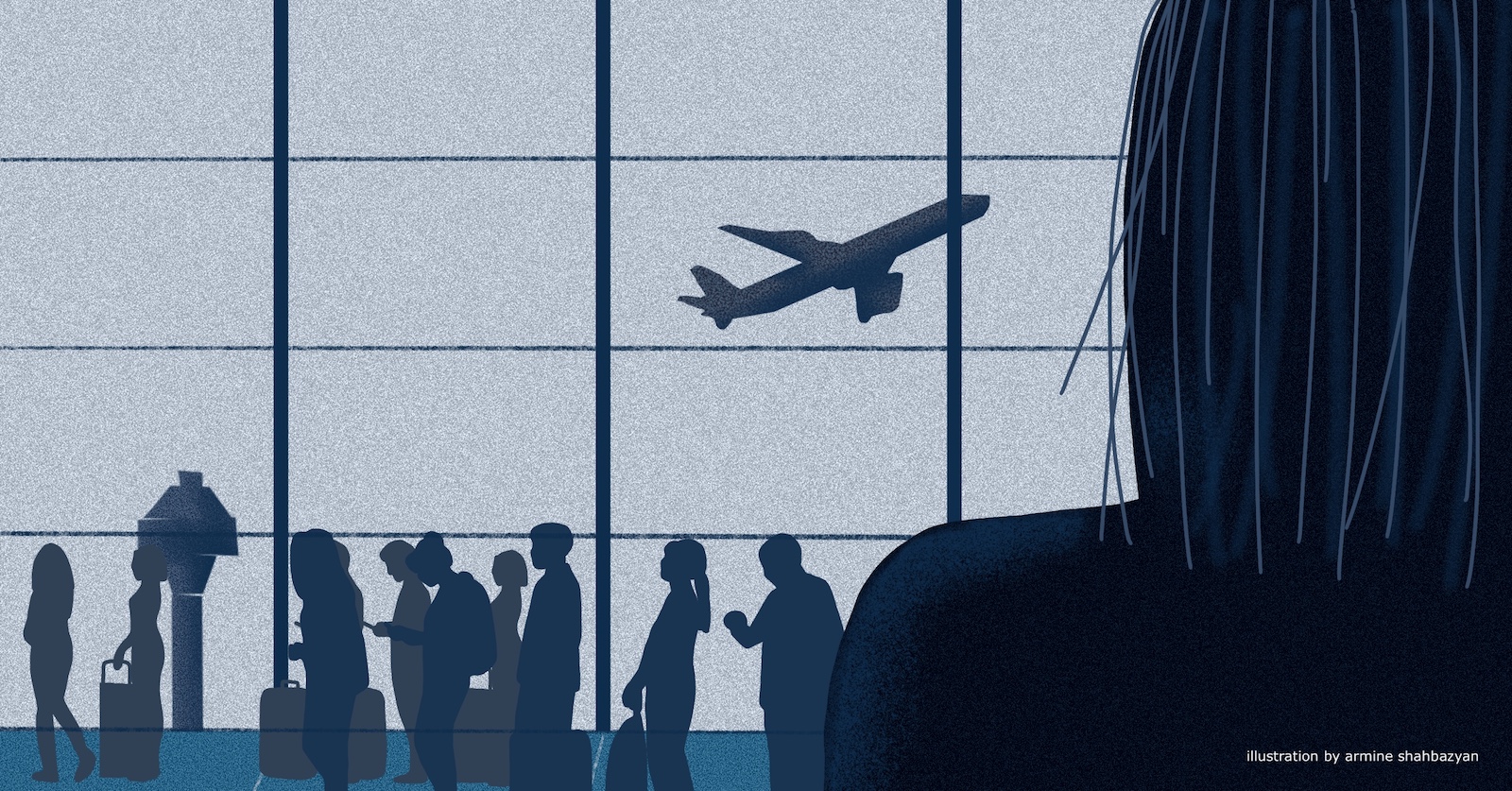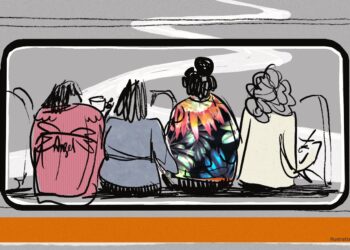
Listen to the article.
I’m at Dubai International Airport. It’s 7a.m., and I’ve just woken up after a few hours of sleeping in a freezing sleeping pod, following an exhausting week in Uzbekistan. I’m still tired, and I didn’t have time to freshen up—I underestimated the time it would take to get from Terminal 3 to Terminal 2. It was like traversing a city.
The screen shows my flight to Yerevan is boarding. I make my way to gate F9, where the 8:10 a.m. flight is departing—or rather, where you board the bus to take you to the plane.
A few passengers are already standing in line, so I join them. Slowly, more people gather behind and around me. I zone out, as one does in a queue where nothing much is happening.
In line, I overhear a woman’s frustrated voice and turn to see her—clearly French-Armenian—scolding her children. She is with her, presumably, French husband. The children, a boy and a girl around 12 or 13 years old, look just like their father. As she reprimands the children for some unknown infraction, they stand silently, zoned out like me, with the same distant gaze as their father. They seem accustomed to this, I thought.
About 15 minutes later, after more mind-numbing waiting and staring into space, I heard her complaining again, this time in English, as though she wanted the rest of us to hear. “It’s not right to put Yerevan next to Baku!” she says. Not quite understanding, I look over at gate F10, just beside ours, and see it’s for Baku, also with an 8:10 a.m. departure time. Passengers are already lined up, just a few short feet away from our gate.
She goes on, “It’s not Dubai’s fault obviously, but can you imagine? Baku! Next to Yerevan!” She adds a sarcastic, “Woohoo!” for emphasis.
I glance at the passengers for Baku. Each time I do, someone is looking back at me. Not staring, but clearly curious, just as I am about them.
Of course, the mutual curiosity isn’t coming from the same place, nor could it be compared. Less than a year prior, Azerbaijan had launched a war after a crushing 9-month blockade on Artsakh’s Armenians and ethnically cleansed them. Azerbaijan still holds and tortures Armenian POWs and its president constantly threatens further aggression against Armenia. The regime makes belligerent claims to practically the entirety of Armenian territory.
Looking at their queue, I couldn’t help but wonder how many of them had cheered on the ethnic cleansing of Armenians from Artsakh. How many believe their government’s propaganda that Armenians had no claim to any land in the region? Are any of the young men war veterans, and of those, could any of them have participated in the torture and mutilation of Armenian civilians and POWs? It wasn’t far-fetched to at least assume that someone in the queue had had images of Armenians being tortured on their phones, given that approximately 20,000 Azerbaijani users had downloaded these images—as shareable emojis—in five days.
So no, the queues aren’t the same.
Socioeconomically, both lines appear quite similar in terms of affluence and diversity. Perhaps there are slightly more foreigners going to Yerevan, but the difference is barely noticeable. In the Baku queue, I noticed a European man in a soccer jersey and an Azeri woman dressed in a blouse and pants—solidly middle class. In our line, an Armenian couple stood chatting relaxedly, the woman with a travel pillow around her neck—also middle class. Behind me, two young foreign women, likely UWC students, are talking. One is reassuring the other she’d enjoy her time in Armenia. The friend seems a little apprehensive.
I glance back at the Baku line and briefly lock eyes with a woman around my age.
I felt exposed, as if I am now under the same scrutiny I had been projecting onto them—and falling short. I feel irritated, annoyed that I haven’t had time to even wash my face or fix my hair.
As I lift my coffee cup to take a sip, the lid slips off, and coffee spills down my shirt, onto my luggage, and all over the floor. It makes me inordinately angry.
The whole situation starts to piss me off. The French-Armenian woman has a point––this is awkward and unsettling. I quietly decided to approach the staff. They clearly had no idea about the context. I ask the UWC girls behind me to watch my bag and walk over to the front to the FlyDubai staff at the gate
There, I find a Gulf Arab woman in hijab and an Indian man working at the computer behind the desk; both look busy. I approach a young woman standing off to the side. I wanted to keep things discreet; this situation was already uncomfortable enough. As I get closer, she smiles, and I think, “She’s going to think I’m crazy.”
I lean in and say, “So, obviously you wouldn’t know this, but there was a war?” discreetly pointing to Gate F10 for Baku. I watch her face for any sign of understanding, but she just stares at me, confused. I continue, “There’s a conflict between our two countries. If you could pass along to your superiors that maybe Yerevan and Baku shouldn’t be right next to one another, that would be great.” Her expression shifts as she begins to understand, though she responds a bit louder than I had hoped: “Ah, so it’s not good between your countries?”
I smile, bringing the volume of my voice down further, “No. No, it’s not.” She nods quickly, “Yes, absolutely we will tell them.”
I thank her and turn to rejoin the queue, but notice the French-Armenian woman standing nearby. She had overheard me. Now looking at me intently, she asks in Western Armenian, “Did you tell them about Baku?” I nod, “Yes”.
And that’s when everything unraveled. Emboldened by my small gesture, she suddenly erupts. She begins shouting at the staff, “You want us to be comfortable when we travel, yet you put Yerevan right next to Baku?”
This was the worst possible outcome. She was drawing attention from everyone nearby, including the passengers for Baku, who are now looking over. Her shouting continues. I massage my temples, mortified.
The woman with the neck pillow next to me asks, “What’s going on, what is she saying?” I quickly explain, and she groans, glancing back at the commotion. By now, the Baku passengers had shifted their attention, listening intently to the outburst. I could feel the tension building in our queue, the Armenians silently willing the woman to stop, all of us uneasy.
The woman keeps going, “You don’t know what they are doing to us!” The staff, caught off guard, freezes in place, mouths slightly open for a few seconds before they attempt to calm her down. But she had no interest in de-escalating.
“Who’s responsible for this? YOU?” she yells, pointing at the young Indian man behind the computer at the gate. He tries to reason with her, but all I could make out was his calm, repeated, “Ma’am, please.”
She keeps shouting, right up until the moment they start boarding us onto the bus. Even then, her anger doesn’t subside as they scan her boarding pass and let her through.
When my turn came, I stepped out and saw the bus. But I hesitated, double-checking to make sure it was the right one, half-imagining the nightmare of accidentally getting on the Baku bus and having to explain myself later.
Of course, it’s not just Armenians who bear the scars of Baku’s policies. Azerbaijani dissidents also face mounting repression, especially as COP29 approaches. Was there someone in that queue, silently fearing they might be arrested upon landing home? It was possible. But not likely.
In the end, it was this twisted psychology—her anger, our collective embarrassment, all while enduring the stress of being next to passengers you can’t help but assume support their government’s genocidal policies against your people. The woman was unhinged, and it was mortifying for everyone in the Yerevan queue.
But, the thing was, she wasn’t wrong.
Also see
Of Mines and Hope
“Crossing the bridge with no return, is indeed final. Artsakh is behind you, and you are here, in safety but with a thousand internal mines that will explode sooner or later,” writes Tamara Grigoryan, reflecting on her experiences a year after the ethnic cleansing of the Armenians of Artsakh.
Read moreThe Women of “Bazaarastan”
A 36-hour bus ride from Yerevan to Istanbul, passing through Georgia due to the closed Turkey-Armenia border, explores the lives, struggles and surprising bonds among the women struggling to make a living known as “bazaarchis”. It also reveals hidden stories of women “beaten down by their destiny.”
Read moreThe Now of Literature, After the War
How does war shape the collective narrative? How have Armenian writers since the 1990s approached the impact of multiple wars? Mariam Aloyan looks at Armenian “war literature” spanning generations and decades.
Read moreArmenian journalists reporting on breaking news in Armenia and Artsakh for global media outlets frequently face scrutiny regarding their objectivity because of their ethnicity, suggesting an underlying bias that undermines their professionalism and reflects a covertly racist perspective.







